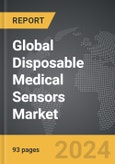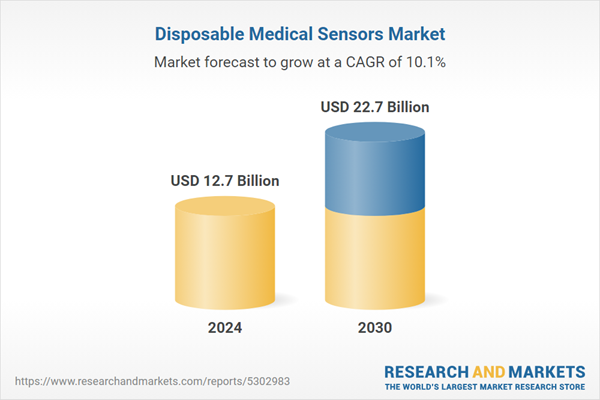Global Disposable Medical Sensors Market - Key Trends & Drivers Summarized
Why Are Disposable Medical Sensors Essential in Modern Healthcare?
Disposable medical sensors are transforming healthcare by enabling accurate, real-time monitoring of vital signs, biochemical markers, and physiological changes in patients, all while maintaining high standards of hygiene and reducing the risk of cross-contamination. These sensors, which are used for a single patient and then discarded, provide critical data on metrics such as heart rate, blood pressure, oxygen levels, and glucose levels. This single-use design is particularly valuable in settings where infection control is paramount, such as intensive care units, emergency rooms, and surgical suites. Disposable sensors are typically integrated into devices like patches, catheters, and wearable monitors, making them versatile and minimally invasive. Their flexibility and ease of use have expanded their applications in both hospital and home care settings, allowing healthcare providers to continuously monitor patients with chronic conditions or those recovering from acute illness, ensuring timely intervention when needed.The surge in demand for remote patient monitoring and point-of-care diagnostics has also heightened the need for disposable sensors, especially as healthcare systems shift toward more patient-centered and decentralized models of care. With an increasing emphasis on early detection and prevention, these sensors are valuable tools in monitoring at-risk populations, enabling proactive healthcare interventions. For instance, disposable biosensors that monitor blood glucose or detect signs of sepsis provide crucial data that can help in preventing complications and improving patient outcomes. As a result, disposable medical sensors are becoming essential tools in modern healthcare, helping to streamline workflows, support infection control, and enhance patient safety.
What Types of Disposable Medical Sensors Are in Demand?
Disposable medical sensors come in a variety of types, each designed to meet specific diagnostic and monitoring needs within healthcare. Biosensors, for instance, are widely used for glucose monitoring in diabetic patients and can detect other biomarkers associated with cardiac and respiratory conditions. Optical sensors are another commonly used type, especially in pulse oximeters, which measure blood oxygen saturation levels - an essential metric in managing respiratory diseases and COVID-19. Chemical sensors, often integrated into wearable devices, detect changes in blood chemistry, such as pH and electrolyte levels, providing crucial insights into metabolic conditions. These sensors are particularly popular in ICU settings, where close monitoring of vital signs is critical.Additionally, pressure sensors are commonly used in disposable catheters and in monitoring devices for patients with cardiovascular conditions. Temperature sensors are another important category, used in wearable patches that provide continuous body temperature readings, which are essential for infection management. Demand for electrochemical sensors is also rising, as they are utilized in detecting specific chemicals in body fluids, supporting diagnostic applications such as pregnancy tests and drug monitoring. With healthcare moving towards more personalized and preventive models, the demand for these various types of disposable sensors is increasing, as they provide precise, cost-effective, and patient-friendly options for continuous and accurate monitoring.
How Are Technological Innovations Impacting Disposable Medical Sensors?
Advancements in sensor technology, materials, and connectivity are revolutionizing the disposable medical sensors market, enabling greater functionality, accuracy, and user comfort. One significant advancement is in micro-electromechanical systems (MEMS), which allow for the development of ultra-small sensors that can be integrated into wearable and minimally invasive devices. MEMS technology enables higher sensitivity and accuracy, which is crucial for monitoring subtle physiological changes. Additionally, flexible electronics and biocompatible materials are making disposable sensors more comfortable and safer for prolonged use. Sensors designed with materials that mimic the flexibility of skin, for instance, can be worn continuously without causing irritation, making them ideal for long-term monitoring.Wireless connectivity and IoT integration are also major technological advancements in the disposable medical sensors market. Sensors equipped with Bluetooth or NFC technology enable real-time data transmission to smartphones, tablets, or cloud-based platforms, facilitating remote patient monitoring and telehealth services. AI-powered analytics platforms enhance the utility of disposable sensors by processing vast amounts of data quickly, identifying trends, and alerting healthcare providers to potential issues. These innovations improve patient engagement and allow for more personalized healthcare solutions. Together, these technological advancements are making disposable medical sensors more effective, accessible, and adaptable, expanding their role in modern healthcare delivery.
What Is Driving Growth in the Disposable Medical Sensors Market?
The growth in the disposable medical sensors market is driven by several key factors, including the rising prevalence of chronic diseases, the growing demand for remote patient monitoring, and advancements in sensor technology. With the global increase in chronic conditions such as diabetes, cardiovascular diseases, and respiratory illnesses, there is a heightened need for continuous monitoring solutions that can support proactive management. Disposable sensors offer a cost-effective and hygienic option for chronic disease monitoring, aligning well with the trend toward preventive healthcare. The COVID-19 pandemic further accelerated the adoption of remote monitoring and telehealth, where disposable medical sensors play a pivotal role in enabling accurate, at-home health tracking.The growing demand for minimally invasive diagnostic tools and infection control is another significant growth driver. Single-use sensors minimize the risk of cross-contamination and infection, which is especially important in post-pandemic healthcare settings where infection control is prioritized. Additionally, technological advancements in miniaturization, flexible electronics, and wireless data transmission have made disposable sensors more affordable and easier to integrate into everyday healthcare. Government initiatives supporting digital health and remote patient care, as well as the expansion of telehealth services, are also contributing to market growth. Together, these factors are propelling the demand for disposable medical sensors, positioning them as essential tools in the shift toward digital, patient-centered healthcare.
Report Scope
The report analyzes the Disposable Medical Sensors market, presented in terms of market value (US$ Thousand). The analysis covers the key segments and geographic regions outlined below.- Segments: Product (Biosensors, Pressure Sensors, Accelerometer Sensors, Temperature Sensors, Image Sensors, Other Products); Application (Diagnostic, Patient Monitoring, Therapeutic).
- Geographic Regions/Countries:World; United States; Canada; Japan; China; Europe (France; Germany; Italy; United Kingdom; Spain; Russia; and Rest of Europe); Asia-Pacific (Australia; India; South Korea; and Rest of Asia-Pacific); Latin America (Argentina; Brazil; Mexico; and Rest of Latin America); Middle East (Iran; Israel; Saudi Arabia; United Arab Emirates; and Rest of Middle East); and Africa.
Key Insights:
- Market Growth: Understand the significant growth trajectory of the Biosensors segment, which is expected to reach US$6.3 Billion by 2030 with a CAGR of a 9.9%. The Pressure Sensors segment is also set to grow at 9.7% CAGR over the analysis period.
- Regional Analysis: Gain insights into the U.S. market, valued at $3.3 Billion in 2024, and China, forecasted to grow at an impressive 14.5% CAGR to reach $5.9 Billion by 2030. Discover growth trends in other key regions, including Japan, Canada, Germany, and the Asia-Pacific.
Why You Should Buy This Report:
- Detailed Market Analysis: Access a thorough analysis of the Global Disposable Medical Sensors Market, covering all major geographic regions and market segments.
- Competitive Insights: Get an overview of the competitive landscape, including the market presence of major players across different geographies.
- Future Trends and Drivers: Understand the key trends and drivers shaping the future of the Global Disposable Medical Sensors Market.
- Actionable Insights: Benefit from actionable insights that can help you identify new revenue opportunities and make strategic business decisions.
Key Questions Answered:
- How is the Global Disposable Medical Sensors Market expected to evolve by 2030?
- What are the main drivers and restraints affecting the market?
- Which market segments will grow the most over the forecast period?
- How will market shares for different regions and segments change by 2030?
- Who are the leading players in the market, and what are their prospects?
Report Features:
- Comprehensive Market Data: Independent analysis of annual sales and market forecasts in US$ Million from 2024 to 2030.
- In-Depth Regional Analysis: Detailed insights into key markets, including the U.S., China, Japan, Canada, Europe, Asia-Pacific, Latin America, Middle East, and Africa.
- Company Profiles: Coverage of players such as Ambu A/S, Analog Devices, First Sensor, GE Healthcare, Honeywell International, Inc. and more.
- Complimentary Updates: Receive free report updates for one year to keep you informed of the latest market developments.
Some of the 42 companies featured in this Disposable Medical Sensors market report include:
- Ambu A/S
- Analog Devices
- First Sensor
- GE Healthcare
- Honeywell International, Inc.
- Medtronic plc
- NXP Semiconductors N.V
- OmniVision Technologies
- Philips Healthcare
- Sensirion AG
- Smiths Medical Inc.
- STMicroelectronics
- TE Connectivity Ltd.
This edition integrates the latest global trade and economic shifts into comprehensive market analysis. Key updates include:
- Tariff and Trade Impact: Insights into global tariff negotiations across 180+ countries, with analysis of supply chain turbulence, sourcing disruptions, and geographic realignment. Special focus on 2025 as a pivotal year for trade tensions, including updated perspectives on the Trump-era tariffs.
- Adjusted Forecasts and Analytics: Revised global and regional market forecasts through 2030, incorporating tariff effects, economic uncertainty, and structural changes in globalization. Includes historical analysis from 2015 to 2023.
- Strategic Market Dynamics: Evaluation of revised market prospects, regional outlooks, and key economic indicators such as population and urbanization trends.
- Innovation & Technology Trends: Latest developments in product and process innovation, emerging technologies, and key industry drivers shaping the competitive landscape.
- Competitive Intelligence: Updated global market share estimates for 2025, competitive positioning of major players (Strong/Active/Niche/Trivial), and refined focus on leading global brands and core players.
- Expert Insight & Commentary: Strategic analysis from economists, trade experts, and domain specialists to contextualize market shifts and identify emerging opportunities.
Table of Contents
Companies Mentioned (Partial List)
A selection of companies mentioned in this report includes, but is not limited to:
- Ambu A/S
- Analog Devices
- First Sensor
- GE Healthcare
- Honeywell International, Inc.
- Medtronic plc
- NXP Semiconductors N.V
- OmniVision Technologies
- Philips Healthcare
- Sensirion AG
- Smiths Medical Inc.
- STMicroelectronics
- TE Connectivity Ltd.
Table Information
| Report Attribute | Details |
|---|---|
| No. of Pages | 288 |
| Published | February 2026 |
| Forecast Period | 2024 - 2030 |
| Estimated Market Value ( USD | $ 12.7 Billion |
| Forecasted Market Value ( USD | $ 22.7 Billion |
| Compound Annual Growth Rate | 10.1% |
| Regions Covered | Global |









